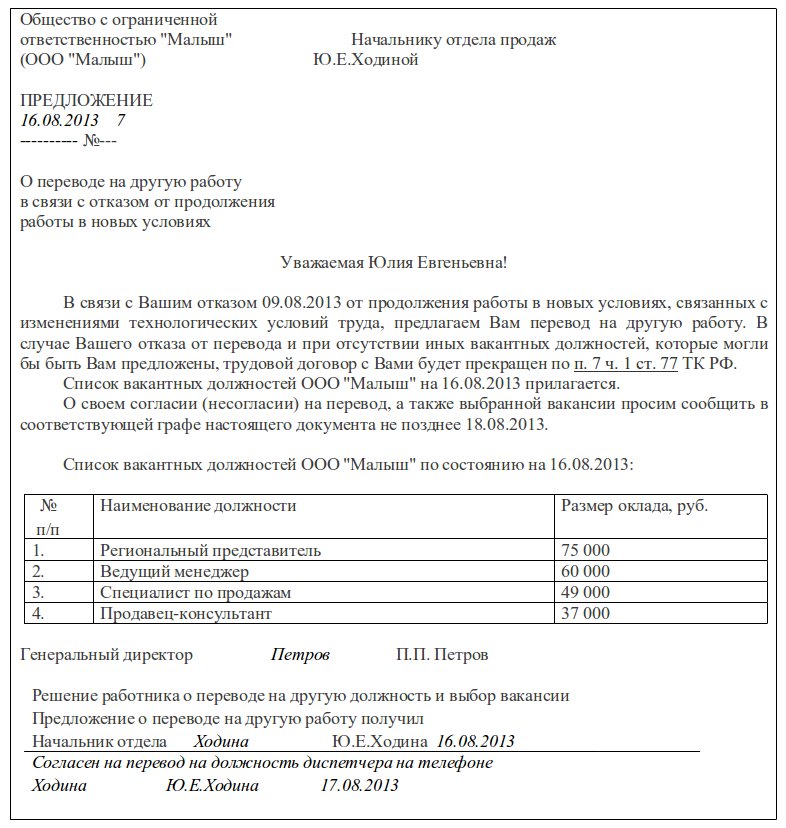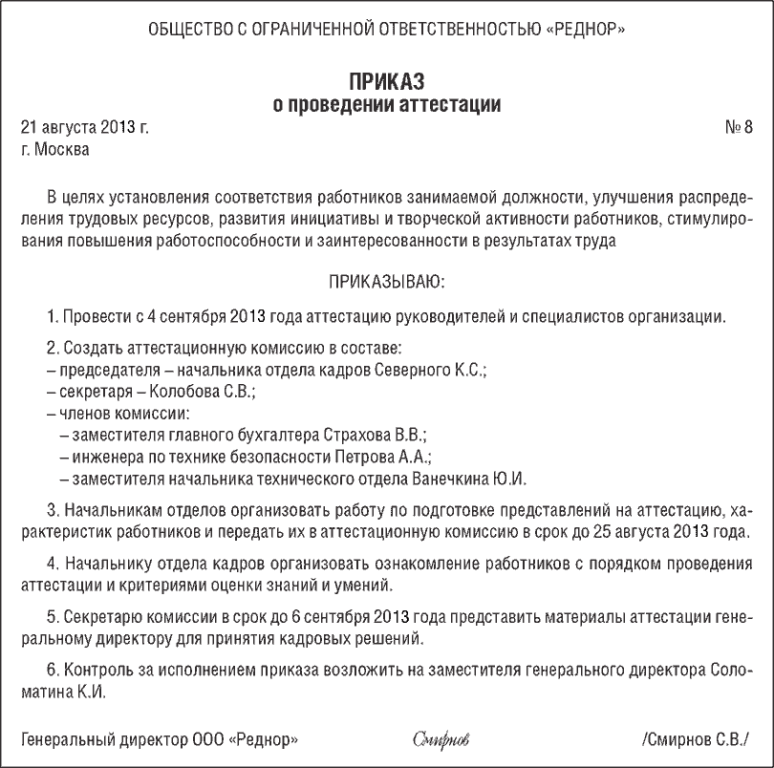Dismissal at the initiative of the employer steps. Dismissal at the initiative of the employer
This memo will be interesting to any manager or entrepreneur. With high probability, it will help save the company’s money, as well as the calmness of the manager. In the current labor law (Labor Code of the Russian Federation), 18 provisions are fixed that justify motives for dismissal on the initiative of the employer.
For reference: in 1918 there were four such reasons, in 1922 - eight, in 1971 - fourteen. The given statistics testifies that the labor legislation develops by toughening discipline. For employers, this phenomenon has a positive and beneficial dynamics.
But at the same time, it should be unequivocally understood that this list has a clear number of provisions that cannot be changed or supplemented. But this pattern has an exception. It is provided for by labor relations, which are based on a contractual agreement of the parties.
For example, at this rate Labor Code employees who occupy senior positions (Section 3 of Art. 278), employees working for individuals (Art. 307) and people working in religious organizations (Art. 347) may be dismissed.
The general list of grounds for dismissal at the request of the employer is referred to in Article 81 of this code. Clauses 1, 2, 3, 5, 6, 11, 12 apply to all categories of workers without exception. But there are points, and these are 4, 7, 8, 9, 10 and 13, which can be applied only to certain categories of workers - the general director, the chief accountant, etc. But in this article will be considered only those reasons for dismissal that are relevant to all employees. Grounds for dismissal are divided into two groups.
Reusable employee’s failure to perform his direct work duties without good reason. Such violations may include:
- absence in the workplace;
- refusal to perform work due to changes in the internal regulations;
- not undergoing medical control;
- refusal of training and delivery of certification for labor protection;
- safety checks if required for admission to work.
These reasons can be grounds for dismissal only if the employee has had disciplinary action during the previous year. If there was no disciplinary action against the employee, he cannot be dismissed for the reasons listed above. The employer in some cases removes the employee from work, for example, to undergo a medical examination, and if the employee refuses, publishes and after that, if the employee still violates, he can dismiss him.
Single violations:
- A walk or absence in the workplace without good reason for four hours.
- Being present at work in a drunken or other inadequate condition, if this fact is certified by a medical certificate or is reasonably proven by witnesses.
- Disclosure of commercial, state or official secrets, which became available to the employee in connection with his official activities.
The reason for such a dismissal is a violation of the terms of the agreement on keeping secrets entrusted to him in secret. Violation of occupational safety rules if they had consequences dangerous for human life and health. Gross violations of their work duties by employees has a clear, exhaustive list.
If at the conclusion employment contract the employee reported false information about himself or provided non-real documents (for example, education, employment, etc.). This article has something in common with the article about dismissal due to the lack of a qualification document, if this is required by regular rules. The only difference is that in the latter case, the dismissal is not the fault of the employee.
Dismissal of an employee for reasons beyond his control
For reasons beyond his control, the dismissal of an employee will be lawful if the worker cannot fulfill his duties for health reasons, or due to low professional qualifications. You can determine the level of professionalism through employee certification. To do this, the procedure for checking the level of professional knowledge, which involves:- development of certification position at the enterprise;
- the creation of a certification commission;
- certification should be applied to all employees of a certain professional group;
- certification activities should have a planned character;
- results of certification are recorded in the relevant conclusions, which are the basis for termination of the employment contract at the initiative of the employer.
Liquidation or termination of the enterprise.
Reduction number of employees. Dismissal under this article implies a written personal warning of workers two months before the date of dismissal. At the same time, information is transmitted to the employment service for each particular employee, indicating the specialty, skill level and salary amount.
Also, the employer must notify the planned trade union body in two months, if it concerns individual employees, and three months, if dismissals are planned on a massive scale. In order for this type of dismissal to not subsequently reverse the appeal of the legality of such decisions, it is necessary to adopt an order to reduce the staff, as well as orders to dismiss each individual employee.
But here it is necessary to take into account the advantages of some workers over others, related to family conditions or the availability of benefits. Employee cannot be firedif he is temporarily unable to work or is on vacation, including maternity leave. The exception is the liquidation of the organization.
The dismissal allowance in the amount of the average monthly wage should be paid if the employee is dismissed:
- for health,
- while reducing staff
- according to the results of certification,
- in case of liquidation of the organization.
Read more in the article about
not necessary in all cases. However, if you do not notify the employee in a situation where it is necessary, he will have a good reason for reinstatement. In the article, we will further consider the grounds for dismissal provided by law, and also tell you when an employee’s warning about termination of the contract is required, and when it is not.
Dismissal at the initiative of the employer - when is it required and in what cases is dismissal allowed without warning?
The Labor Code of the Russian Federation provides, as an initiator, the termination of an employment contract by both an employer and an employee. There are cases when the dismissal is made by agreement of the parties, that is, by mutual agreement - the initiative in this situation comes from both.
The grounds for termination of the contract at the request of the employer are contained in Part 1 of Art. 81 of the Labor Code of the Russian Federation. In some situations, the employer is obliged to notify the worker in advance that the contract will be terminated. If you violate the condition of the notification, the dismissal may be illegal (when checking the organization or when the employee goes to court, the state labor inspectorate, the prosecutor's office). In this regard, it is important to know an exhaustive list of the grounds for which the employee’s notice of dismissal is mandatory.
So, notify the employee is required in cases where:
- the organization is liquidated, i.e. ceases to exist as such, or the IP ceases activity;
- the employee did not pass the test (on probation);
- reduced staffing or number of employees;
- a fixed-term contract was signed with the employee and it expires.
Notifications are not required when:

Employee warning in a fixed-term labor contract (notice period, procedure)
Notification is mandatory in a situation when an employee has a fixed-term contract and his term ends. According to the requirements of art. 79 of the Labor Code of the Russian Federation, the authorities notify such employee 3 days before the expiration of the contract.
IMPORTANT! If a worker replaces another employee who for some reason does not work, for example an employee who has gone on maternity leave, no notification is required (part 1 of article 79 of the Labor Code).
How the employee should be notified the law does not describe - accordingly, the notification can be made up in any form. The main thing is that his delivery was confirmed by the employee’s signature or an act if the worker refused to sign.
IMPORTANT! It is necessary to issue an order of dismissal no later than the last. working day employee, since part 4 of Art. 58 of the Labor Code of the Russian Federation establishes the following: if no one has declared that a fixed-term contract is terminated after its expiration, such an agreement begins to operate indefinitely. If the order is issued at the wrong time, the employee may be reinstated at work, since at the time of the dismissal there were no grounds for it.
Employee warning of dismissal on the basis of test results (notice period, procedure)
If the parties have agreed that at the time of its conclusion it is necessary to include a test condition in accordance with Art. 70 of the Labor Code of the Russian Federation, for an employee a probationary period is established during which an employee will perform his duties, and his superiors decide whether he copes with them or not. It should be noted that the test can not be fixed for some categories of workers, named in Part 4 of Art. 70 of the Labor Code of the Russian Federation (for example, pregnant women).
According to Part 1 of Art. 71 of the Labor Code of the Russian Federation, if the worker did not pass the test, the authorities have the right to dismiss him, be sure to warn about this 3 days before the date of termination of the employment relationship. At the same time, in the same provision there is an indication that such a decision can be appealed in court. Simply put, if the worker was not notified that he was fired, this could serve as a basis for his reinstatement.
In addition, the warning condition in the case when the worker did not pass the test is also important to observe because in the absence of a notice, adverse consequences for the authorities are possible, including administrative liability under art. 5.27 Administrative Code. Moreover, the warning must be written - it is this requirement that is imperatively established in Art. 71 of the Labor Code of the Russian Federation.
Alert to employee on layoff redundancy (notice period, procedure)
In Art. 180 of the Labor Code of the Russian Federation lists the guarantees provided to employees upon termination of staff redundancy. One of these guarantees is a notice of dismissal no later than 2 months before the day of dismissal. The notification is issued personally to each employee and is given under the signature, that is, it is assumed that the warning must be written.
There are situations when an employee does not want to receive a notification. In this case, its content is read out to the worker with witnesses, after which an act is drawn up confirming that the text of the notification has been communicated to the employee. The act is drawn up in any form and is signed by the authorities and witnesses.
IMPORTANT! There is a rule provided by Part 2 of Art. 296 of the Labor Code of the Russian Federation: an employee who works in seasonal jobs should be informed of the dismissal of staff redundancy 7 days before the dismissal. In addition, according to Part 2 of Art. 292 of the Labor Code of the Russian Federation, if an agreement has been concluded with an employee for a period of up to 2 months, he should inform about the dismissal of staff reductions in 3 days.
Alert employee of dismissal in connection with the liquidation of the company (notice period, procedure)
The terms of a notice of dismissal during the liquidation of a company are similar to the terms of a warning when staff are reduced (in general - 2 months, with seasonal work - 7 days, with a fixed-term contract up to 2 months - 3 days). It is necessary to warn absolutely all employees of the organization, including those who are on vacation or on sick leave.
An important feature of the dismissal on the grounds under consideration is that it organizes a special liquidation commission (part 3 of article 62 of the Labor Code of the Russian Federation), which is given the task to liquidate the company in a certain period of time in compliance with the established procedure. Since its inception, the commission replaces the bosses, including the right to represent the company in court. Accordingly, the obligation to notify employees falls on the shoulders of the commission (more precisely, its chairman). If the cause of liquidation was bankruptcy, then the bankruptcy trustee warns employees about it.
The main rule - the notification must be made in advance (it is possible more than 2 months before the dismissal). This is due to the fact that the elimination may be delayed. The warning is given to employees under the signature. If the employee refuses to sign, then the act is drawn up - in the same manner as in the case of dismissal for redundancy.
IMPORTANT! In case of liquidation of the company and reduction of staff, the dismissal of employees may be carried out by agreement of the parties ahead of schedule. In this case, the dismissed person is paid compensation in the amount of average earnings in proportion to the time remaining until the end of the warning period (part 3 of article 180 of the Labor Code of the Russian Federation).
As you can see, the article not only provides an exhaustive list of cases when a warning about the dismissal of an employee is mandatory, but also specifies a specific timeline for notifying employees and describes the consequences of non-compliance with the notification requirement.
The need for legal registration of personnel issues. Article 81 of the Labor Code of the Russian Federation regulates all issues that may arise in connection with the dismissal of an employee on the initiative of the employer. However, having grounds for termination of an employment contract with a negligent employee, the head of the company must file a dismissal legally competently, because in accordance with the law, the reinstatement of the employee will occur in case of violations by the court, and this will bring additional costs to the company. On how to dismiss an employee on the initiative of the employer, know qualified personnel specialists. But not always the company has the ability to maintain the personnel department in accordance with the staffing table, so business leaders often assign responsibilities for solving personnel issues to incompetent employees. And this is fraught with conflict situations and administrative fines.
Employee dismissal procedure
To terminate an employment contract with an employee at the initiative of the employer, it is necessary to have documents confirming the grounds for dismissing an employee, be it repeated disciplinary actions or objective reasons related to the liquidation of the enterprise. Dismissal takes place as follows:
- the employer introduces the employee to the notice of dismissal;
- an order is issued to terminate the employment contract;
- a full calculation is made on the last day of work with the issuance of a workbook and the necessary documents.

But before proceeding to the developed scheme of dismissal, it is necessary to do the work on the paperwork. The first paragraph of Article 81 specifies the reason for termination of the contract - this is “the liquidation of the organization or the termination of activities by an individual entrepreneur”. Having such a basis, the manager is obliged to notify employees no later than two months before the forced termination of work. Employment services in advance receive lists of employees from a closing enterprise and register unemployed, providing severance pay from an employer and payments in accordance with the law.
The second paragraph of Article 81 of the Labor Code of the Russian Federation suggests a similar procedure for processing termination of an agreement, but it has some features, namely:
- the employer does not have the right to dismiss those who have additional social protection (pregnant woman);
- the head of the enterprise should analyze the possibility of the redistribution of human resources, filling the vacant positions, vacated as a result of staff reductions, employees;
- the employer is obliged to offer all the vacant positions in the organization, proving the economic need to reduce the number of employees in the enterprise.
Legal dismissal requires an evidence base consisting of the necessary documents.

Internal local acts in many companies contain additional requirements for employees. This may be, for example, a dress code, which is introduced in the enterprise and is mandatory for its employees. All posts imply the need for polite communication with customers. A flagrant violation of the internal rules can be a reason for conflict between the employer and the employee. Article 81 of the Labor Code of the Russian Federation provides for dismissal due to inconsistencies in the position held by the employee. But the opinion of the leadership for the application of the law in practice is not enough. There is a need for proof in the form of a complaint or a statement from customers, or the results of a qualification attestation.
Change of ownership of the property of the organization - this reason may be the main reason for the dismissal of the management of the company. It is clear that the new team of employees will come along with the new owner, he has every right to do so in accordance with the law. The only condition for workers will be their dismissal with guaranteed payments under the general scheme.
If an employee of the organization commits an offense, it can lead to the termination of the contract, whether it is an abomination, theft or non-fulfillment of official duties. The law (Article 81, paragraph 6) provides for the termination of the employment contract at the initiative of the employer within six months. But it is important to have supporting documents so that the dismissal does not become the cause of personal relationships or the result of a conflict between employees and the manager.
Acts, orders for disciplinary action must have a legal basis, otherwise the labor dispute commission will help to restore justice and protect the worker from unlawful dismissal.
Dismissing an employee is always difficult. There is an opinion that a person becomes a businessman only after he dismisses a friend because of his incompetence. Most often, responsible managers and owners value qualified and reliable employees. But you still have to fire. And they do not always dismiss only careless workers. Sometimes it is a necessary measure, which is forced by entrepreneurs to worsen the financial situation of the company or its restructuring. However, most often the need for dismissal is caused by employee incompetence or non-compliance with the discipline. There are often cases when such a need is caused by complex relationships in a team. These and other reasons lead to the need for action by the administration. Whatever the reason for the dismissal, this action should be approached with a cool head and full compliance with legal procedures. Otherwise, litigation is almost inevitable and the employer’s failure to follow simple formalities can lead to the reinstatement of the employee at work. At the same time he will have to pay for forced absenteeism. And this is always a substantial material loss for the owner.
Of course, most managers prefer to solve problems "peacefully." But, unfortunately, it is impossible to completely avoid the occurrence of conflicts. The purpose of this article is to provide information on how to dismiss an employee on the employer's initiative correctly.
Let's start with the main provisions that are fixed by law. To begin with, let's answer the main question - can an employer dismiss an employee on his own initiative? The answer is simple and categorical. Yes, it has a legal right. Moreover, the legislation provides for many reasons for dismissing an employee on the initiative of the employer. Today, article 81 of the Labor Code of the Russian Federation, which should be used by the heads of enterprises of all forms of ownership, prescribed by law seventeen grounds for dismissal on the initiative of the employer (if you count along with the most important sub-paragraphs). We will consider everything in order.
In today's dynamic world, business conditions are changing continuously. Some professions and activities disappear altogether from the market. These changes are very often grounds for layoffs. There are only three such reasons for dismissal from work at the initiative of the employer in our legislation - termination of activities and liquidation of an enterprise (item 1), reduction of staff or number of employees (item 2), change of ownership (clause 4). In the latter case (clause 4), only executives and their deputies can be dismissed.
The algorithm of administration actions in all these cases is approximately the same.. First, an order is issued with detailed motivation for such a step. The order must contain appropriate wording. For example, if the reason for dismissal is item 1, then the order should contain a reference to the decision of the owner (if the activity of the enterprise is terminated on his initiative) or to the decision of higher or controlling bodies. If the court made the decision, then it is necessary to refer to the corresponding court decision. Similar wording is used when using for dismissal, for example, director p.4. The rationale for reducing the number (staff) and the subsequent dismissal of claim 2, most often is the reorganization. We give an example of such an order:
Sistemotekhnik Ltd.
yekaterinburg, street ХХХХХХХХХХХ
ORDER number 11 from 01/19/2017
On the reorganization of the transport department
In order to improve the efficiency of the transport service and in connection with the conclusion of the contract for large-tonnage transportation from Almaz LLC, I order to reorganize the transport department from April 20, 2017 and to abolish the following positions:
- head of the transport department - 1 unit;
- mechanics - 2 units;
- drivers - 5 units
See also: Leave without maintenance to working pensioners Art. 126
Director Ltd.
"System engineer" _________________ S.V. Vedeneev
Head of Human Resources _________________ V. Krylov

Such an order is issued two to three months before the actual dismissal. In such an order, there are no names of employees to be abbreviated. Persons dismissed due to reorganization sign a personal notice.
If a person refuses to sign, an act is drawn up, which is signed by two witnesses of the refusal.
In the notification, you must offer the dismissed person to take another position in the company. It is important to get a motivated opinion of the trade union organization.
Dismissal of an employee due to insufficient qualifications or mismatch of his position
Such a reason for dismissal is provided for in clause 3 of Article 81 of the Labor Code. Immediately emphasize the attention of managers that the use of such a basis is the most difficult case on which you can dismiss an employee on the initiative of the employer. Often such a dismissal becomes the subject of litigation. The difficulty lies in the need for a motivated conclusion on the qualifications of the employee. Indeed, in court proceedings, an employee dismissed as an economist can present a red diploma, which is issued by the “sharashkina office” (there are many such “universities” in our country). This is a serious argument in court. In order to avoid such conflicts, employees should be certified. This procedure is required for dismissal under paragraph 3 of article 81. Certification can be planned or unscheduled, associated with specific circumstances.
Planned attestations are held periodically (usually once every 1-3 years), their frequency is determined by the internal regulations of the enterprise. Such certifications usually cover certain categories of employees, for example, technologists, laboratory technicians, accountants, etc., as well as separate divisions — the economic department, legal department, etc. accident or accident at work.
In any case, by the order of the head, an attestation commission is formed and the day of the attestation is appointed (most often the order is issued one week before the day of attestation). In the same order or addition to it, the list of employees subject to certification is announced. Employees called for certification should familiarize themselves with these documents in advance (against signature). Leading experts are appointed members of the commission (usually 5-7 people). Some of them may be invited by (for example, from higher education institutions). Do not forget to include in the commission a representative of the trade union organization. A reasoned decision is made by a majority vote. The protocol with the decision of the attestation commission is signed by all its members. With a copy of the protocol under the signature certified employees get acquainted.

Dismissal for disciplinary offenses and for loss of confidence
An exhaustive list of such grounds is set forth in paras. 5 and 6 a d of article 81 of the Labor Code of the Russian Federation. It should be highlighted in paragraph 5. This item is often used to dismiss careless employees who ignore the orders of their superiors and do not fulfill their duties. We draw the attention of managers that an exhaustive list of duties of employees is contained in job descriptions and employment contracts.
To be dismissed under this item, it is necessary that the dismissed employee has a documented disciplinary action. Care must be taken to ensure that in the dismissal case there is confirmation that the dismissed person is aware of the disciplinary action. Such confirmation may be the painting of the person in the order or an act of refusal from such painting. The presence of valid reasons is confirmed by the explanatory note of the employee. If a citizen refuses to write an explanatory note, this can be fixed by act. If the employee believes that he had good reasons, then the responsibility for confirming them lies with the worker himself.




